






GKUP Group
Environmental Concerns: Pollution, illegal dumping, or inadequate waste management
As residents of Sri Lanka, we all play a role in maintaining a healthy environment for every living creature in our region. Today, I want to address several issues related to our local area, particularly focusing on poor city trash management. Having lived in Mahanuwara City (Kandy) for over four decades, I’ve witnessed and experienced the challenges of urban living. Whether we’re government employees or private citizens, it’s our collective responsibility to work together peacefully. Let’s set aside titles like ‘Governor’ or ‘Leader’ and recognize that we all share this village, city, country and this earth, and this. Trash management and environmental cleanliness go hand in hand, and it’s crucial to address these issues through collaborative efforts, awareness campaigns, and stricter waste management regulations. Additionally, safeguarding the Mahaweli River, the longest river in our country, is essential for both environmental sustainability and public health.
Let’s start from Mahanuwara-Kandy: Kandy, also known as Mahanuwara in Sinhala, is a major city in Sri Lanka, located in the Central Province. It was the last capital of the ancient kings’ era of Sri Lanka. The city is situated amidst hills in the Kandy plateau, which spans an area of tropical plantations, primarily tea. Kandy serves as both an administrative and religious city and is the capital of the Central Province. One of its most significant landmarks is the Temple of the Tooth Relic (Sri Dalada Maligawa), which is one of the most sacred places of worship in the Buddhist world. The temple houses the relic of the Buddha’s tooth and has been declared a World Heritage Site by UNESCO. Kandy attracts numerous visitors due to its rich cultural heritage, scenic beauty, and historical significance. Here are some reasons why Kandy is a popular destination: which I am not going further to explain one by one. Anyone can imagine why managing waste effectively in a city like Kandy is crucial for maintaining cleanliness, environmental health, and the well-being of its residents. We have lived for a longer period in Mahanuwara-Kandy itself as students in famous Kandy schools and colleges. We lived there, as for the Vision and Mission of the Kandy Municipal Council, we don’t know who the founder is, but it clearly reflects the needs of our own people and our commitment to enriching our heritage. Living in Mahanuwara-Kandy, we witness firsthand how attractive our city is and how kind and honest the people in the area are. The KMC’s Vision and Mission align with these values.
Vision
“An attractive city that leads through good governance enriching heritage”
Mission
Our mission is to provide and manage all the public utility services, thoroughfares and other welfare activities, ensuring welfare and good health of the people living within the Municipal limits and of those visiting the city daily in protecting historical and natural beauty of the World Heritage city by using the physical, financial and human resources available to the council efficiently and effectively by virtue of the powers vested in it by the Municipal Councils’ Ordinance and other Numerous Acts with much dedication and motivation.
As the author of these articles and a former member of the Commercial Grid Team, I served as Secretary, dedicating my free time to JICA’s collaborative public team, working closely with KMC and local authorities to formulate the Greater Kandy Urban Plan (GKUP). My commitment and goals are focused on fulfilling the second line of the KMC mission. In this paper, I will address critical issues, propose practical project suggestions, outline necessary personnel, and explore international approaches to managing the trash crisis. My overarching goal is to safeguard the welfare and good health of both residents living within municipal limits and visitors to our beautiful World Heritage city. Additionally, I am dedicated to preserving the historical and natural splendor that defines our beloved city here are some strategic steps for more effective waste management:
Sincerely, waste management in Kandy, like many other cities worldwide, faces several challenges. Let’s explore some of the key issues. All findings related to the Municipality can be true, or if they have currently been fixed, the relevant officers can ignore them and focus on the most relevant and latest issues.



Image: The accumulation of trash until the next morning in some places, from approximately 6 PM to early morning, due to tight garbage handling operations can indeed have significant consequences for the atmosphere and pedestrians in Kandy City. The impact may include air pollution, which affects the health and well-being of residents.
Inadequate Infrastructure:
- Kandy lacks sufficient waste disposal infrastructure, including composting facilities, recycling centers, and waste treatment plants.
- The absence of proper facilities can leads to illegal dumping, open burning, and environmental pollution.
Poor Waste Segregation:
- Residents often mix different types of waste (organic, recyclables, and non-recyclables) together.
- Without proper segregation, recycling efforts are hindered, and valuable materials end up in landfills.
Lack of Public Awareness:
- Many residents are unaware of the importance of waste reduction, proper disposal, and recycling.
- Educational campaigns are essential to promote responsible waste management practices.
Uncontrolled Dumpsites:
- Kandy faces challenges related to unmonitored dumpsites.
- These sites contaminate soil, groundwater, and air, posing health risks to nearby communities.
Health and Environmental Impact:
- Improper waste management leads to vector-borne diseases (such as malaria and dengue fever).
- Open burning releases harmful chemicals, affecting air quality and respiratory health.
Visual and Olfactory Effects:
- Improperly managed waste negatively impacts the city’s aesthetics and quality of life.
- Littered streets and unpleasant odors affect residents and visitors.
Limited Resources and Funding:
- Municipal budgets may not allocate sufficient funds for waste management infrastructure and services.
- Kandy needs sustainable funding models to address waste-related challenges.
Population Growth and Urbanization:
- Rapid population increase in urban areas strains existing waste management systems.
- As Kandy grows, waste generation escalates, necessitating better planning and resources.
Behavioral Change:
- Encouraging behavioral change among residents is crucial.
- Promoting responsible waste disposal habits requires community engagement.
Collaboration and Governance:
- Effective waste management requires coordination among local authorities, Mindful NGOs, and citizens.
- Transparent governance and stakeholder involvement are essential.
Addressing these above challenges requires a holistic approach, involving infrastructure development, education, policy enforcement, and community participation. Kandy can work toward sustainable waste management by prioritizing these aspects.
Remember that waste management is a collective effort involving residents, local authorities, and businesses. By implementing these strategies, Kandy can improve its waste management practices and create a cleaner, healthier environment for all.
Let’s go back to JICA and GKUP. The Japan International Cooperation Agency (JICA) has played a significant role in supporting waste management and urban development in Kandy over the past years in Sri Lanka. Here are some key initiatives that have been implemented:
Kandy New Wastewater Management System:
- JICA provided financial assistance for the construction of the Kandy New Wastewater Management System.
- The project aims to address wastewater-related challenges in Kandy, benefiting over 300,000 people, including residents and daily migrants.
- The system improves sanitation, reduces pollution, and enhances the overall quality of life in the city1.
Greater Kandy Urban Plan (GKUP):
- JICA collaborated with local authorities to formulate the Greater Kandy Urban Plan (GKUP).
- The plan revises the urban development vision for Kandy, focusing on sustainable growth, heritage preservation, and efficient waste management.
- It includes strategies for waste reduction, recycling, and infrastructure development2.
Solid Waste Management Master Plan:
- JICA’s assistance extends to formulating a Solid Waste Management Master Plan for Kandy.
- The plan emphasizes strengthening governance, fostering ownership, and implementing waste management based on past experiences.
- It envisions a cleaner, healthier city prepared for rapid urbanization3.
These collaborative efforts between JICA and local authorities demonstrate a commitment to sustainable waste management and city development in Kandy. Frankly, further evolution on the above subject is limited due to a lack of relevant knowledge and resourceful data from authority and public papers and articles.
Let’s jump to our target area, Lewella, where I have faced challenging times while discussing and addressing the current day-to-day issues. I have lodged numerous complaints regarding the area’s trash management sector, including the frontline employees responsible for daily trash collection. My long-term efforts aim to uplift people’s quality of life and find the right solutions to safeguard our county’s natural environment.
Where we live: Lewella, a village and northeastern suburb of Kandy in the Central Province, Sri Lanka, is situated along the banks of the Mahaweli River.
Here are some key details: It appears that my concern is related to a community with nearly 5,000 residents.
Trash Dumping: Improper waste disposal poses a significant challenge to the Mahaweli River.
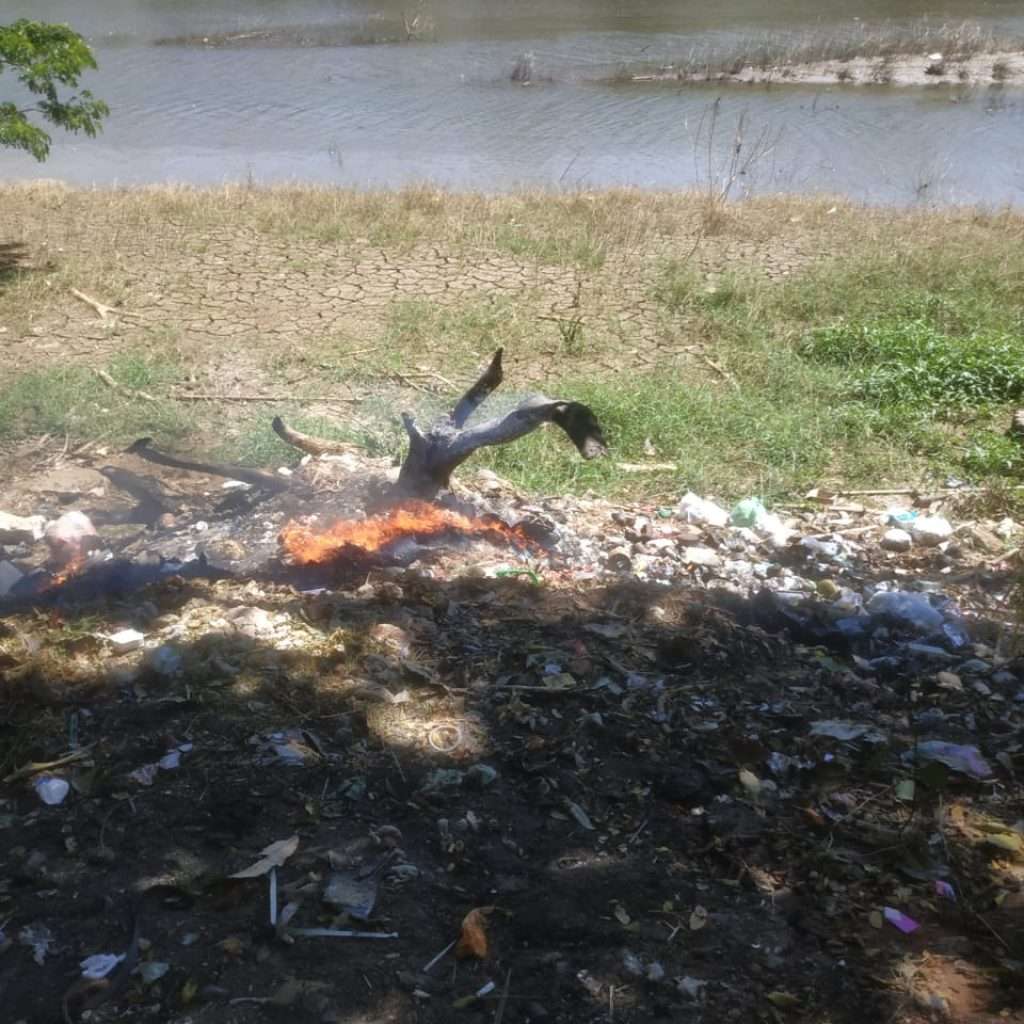
A few Unorganized and Unofficially directed trash collection areas are igniting fires after manual trash segregation. These areas contain all types of trash, and the resulting burning releases smoky emissions that affect nearby main roads and the riverside. The open fires pose a threat to the riverside environment, and the residual waste left over after several days of burning eventually washes into the Mahaweli River, affecting different climate conditions such as the effect of wind and rain
Challenges Facing Mahaweli River:
Water Pollution: Solid waste dumped into the river affects water quality and ecosystems.
Environmental Impact: Open dumping sites near the river contribute to pollution and harm aquatic life.
Health Risks: Polluted water can lead to health issues for communities downstream.
Life and Traffic issues: A few very narrow junctions are used for daily trash collection and burning activities. This has an impact on the lives and nearby properties, resulting in a very smoky environment. Burning trash poses serious health risks to both people directly exposed to the smoke and the environment. It can lead to respiratory issues, air pollution, greenhouse gas emissions, and long-term health problems. Proper waste management and recycling are crucial to mitigate these harmful effects. The road adjacent to the burning activity sites is approximately fifty meters from both the beginning and ending of Wagolla Road.
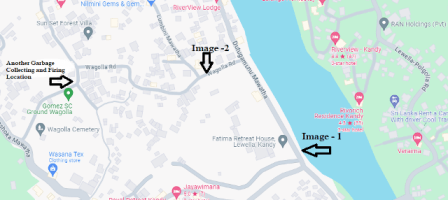
The issue of waste mismanagement in the Lewella area of Kandy is a pressing concern. Here are some observations and challenges related to waste management in that locality:
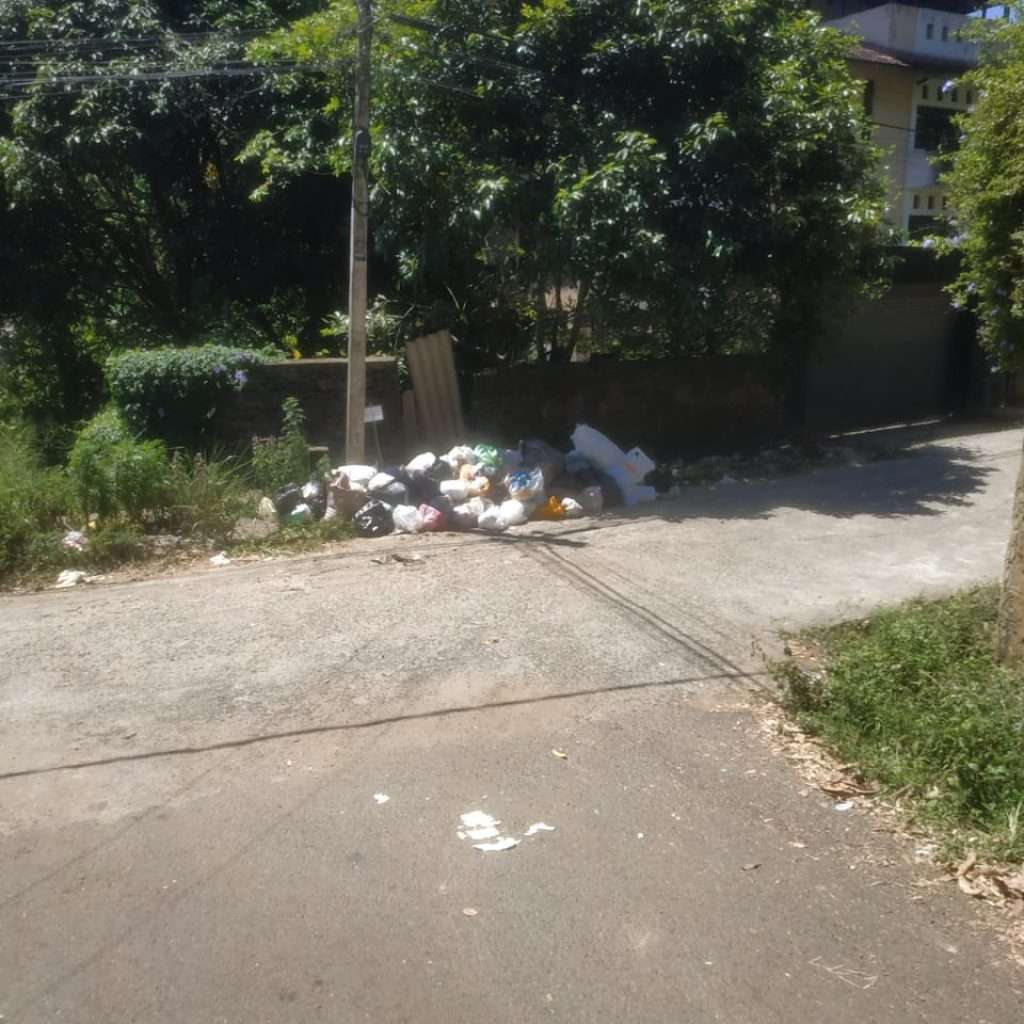
Improper Collection and Disposal:
- The municipal authorities may not have an efficient waste collection system in place.
- Irregular collection schedules or inadequate coverage can lead to waste accumulation on streets and in residential areas.
Lack of Segregation at Source:
- Residents might not segregate waste properly at the source (homes and businesses).
- Without proper separation of recyclables, organic waste, and non-recyclables, effective waste management becomes difficult.
Illegal Dumping and Littering:
- Some individuals may resort to illegal dumping, especially in poorly monitored areas.
- Littering in public spaces exacerbates the waste management challenge.
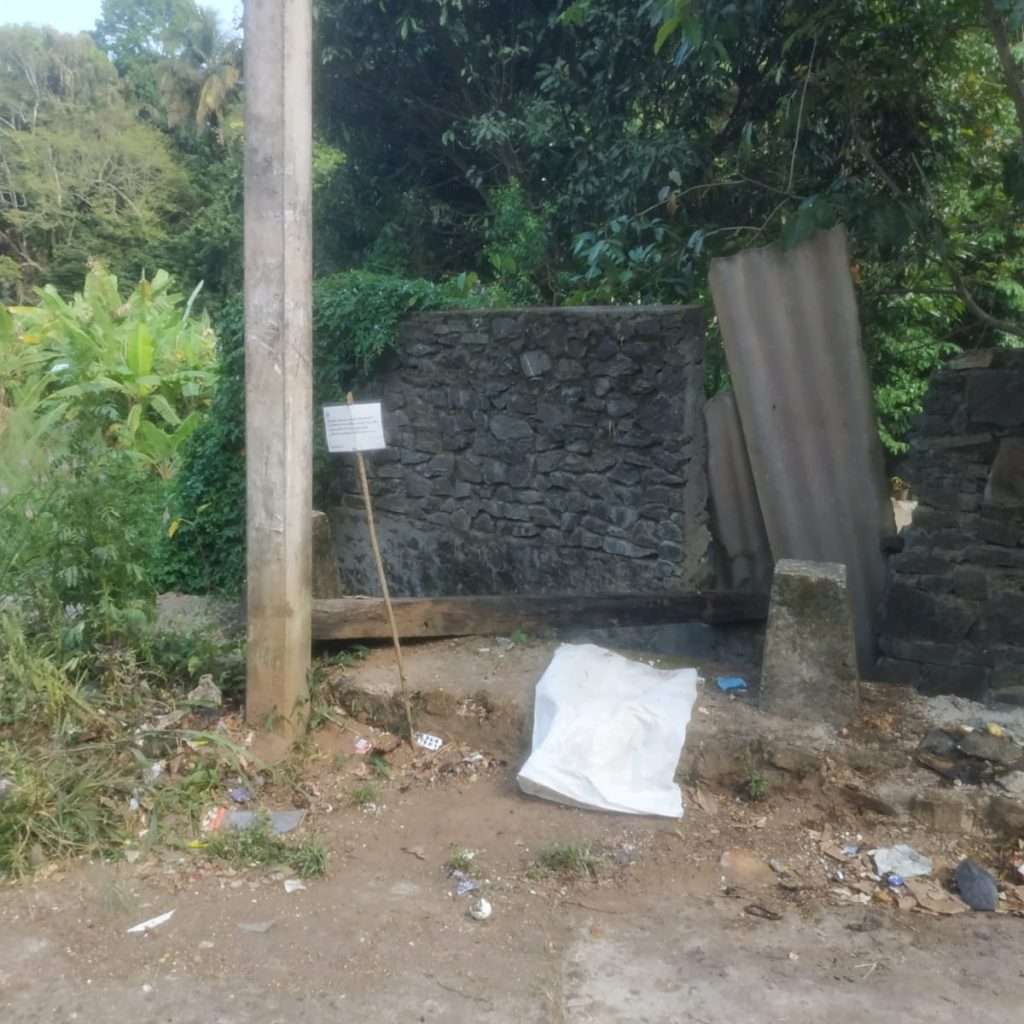
Insufficient Awareness Programs:
- Lack of awareness about responsible waste disposal practices contributes to the problem.
- The municipality should conduct educational campaigns to inform residents about proper waste management.
Inadequate Infrastructure:
- The Lewella area may lack sufficient waste bins, collection points, and recycling facilities.
- Insufficient infrastructure hinders effective waste management.
Environmental and Impact:
- Poor waste management affects the environment, soil quality, and water sources.
- Open burning of waste releases harmful pollutants into the air.
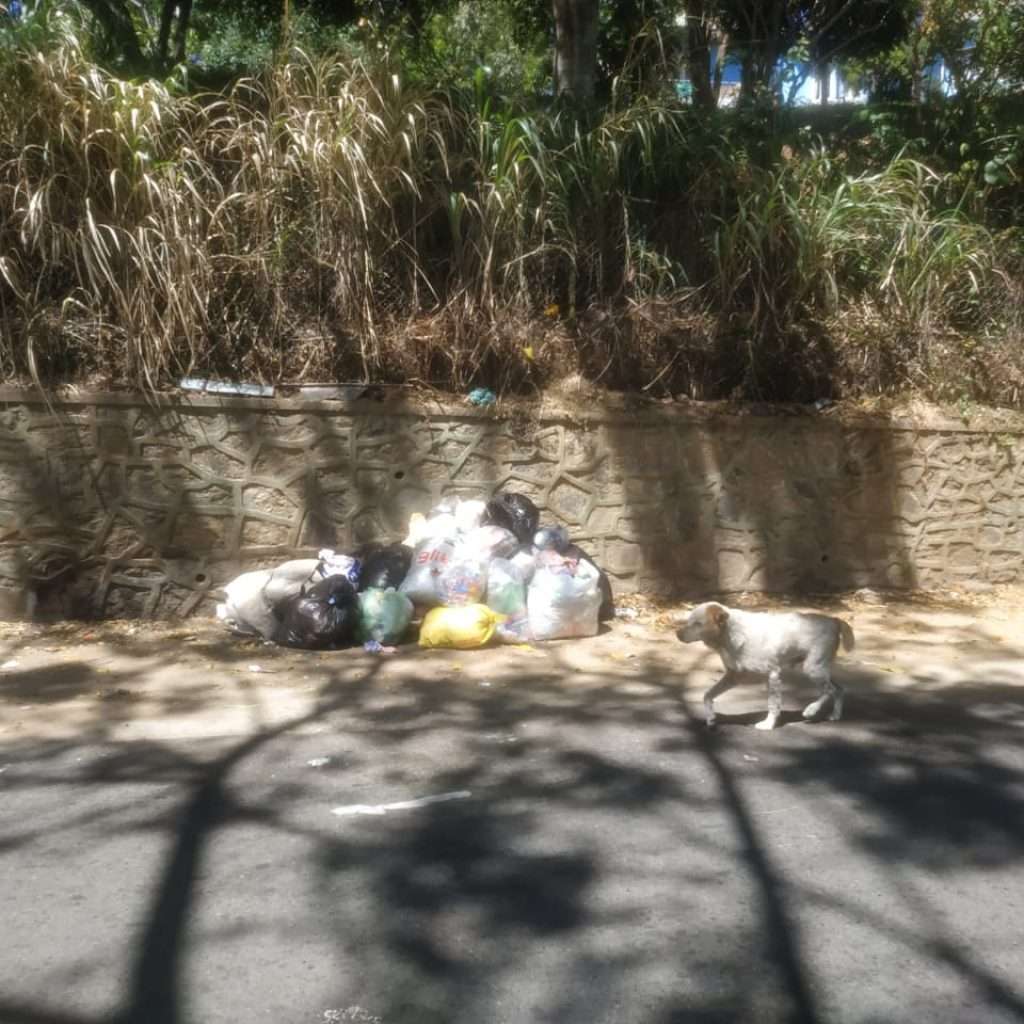
Current Health Risks:
- Accumulated waste attracts pests, leading to health hazards.
- Residents may suffer from vector-borne diseases due to improper waste disposal.
- Disposable diapers often referred to as “nappies,” including adult and other diapers, pose significant challenges in waste management. Raising awareness about proper diaper disposal and exploring innovative solutions is essential for environmental health. In several cases, human-monkey complicity has been observed, due to the rising of many unhygienic trashes being dragged along to other houses. Additionally, unsupervised dogs in villages impact the scenario.
- To dispose of Pedigree dog waste from home, you must monitor and ask the owner of a large or small puppy if they are collecting the waste. It should not be dumped in the nearby area or hidden away. Instead of flush their dog poops down the toilet; it’s one of the most eco-friendly ways of disposing of dog poop. Rather than unknowingly carrying out improper disposal poses a health risk for municipality staff and finely community. Register all dogs in the area will be advantage of starting management of this crisis. Also set up designated areas with waste bins for dog owners to dispose of their pets’ waste. Encourage villagers to use these stations and provide bags for collecting dog poop.
- While implementing strategies to manage village dogs and their poop issues, it’s essential to acknowledge that achieving the desired goal might not always be straightforward. However, persistence and a combination of approaches can make a difference. Lack of Community Engagement:
- The municipality should involve residents, community leaders, and local organizations in waste management initiatives.
- Encouraging community participation can lead to better outcomes.
Lack Of: Staff, Equipment, Motor and Non-Motorized Equipment,
Addressing these challenges requires a collaborative effort between municipal authorities, residents, and relevant stakeholders. By implementing better waste management practices, the Lewella area can improve its environmental conditions and overall quality of life.
Lack of Occupational health and Safety Issues:
Ensuring the safety of municipal workers is crucial for maintaining a healthy and productive community. These dedicated individuals play a vital role in keeping our cities and villages clean, safe, and functional. Municipalities should prioritize worker health and safety.
What do we have to do to reach the goal of proper trash management in the area? Here are some observations and potential solutions. It can be practical or manageable.
Door-to-Door Collection:
- Establish a systematic collection system where waste is collected directly from households and businesses.
- Regular collection schedules should be followed to prevent accumulation.
Recycling Programs:
- Promote recycling by setting up collection points for recyclable materials.
- Collaborate with recycling companies to process and reuse materials.
Composting:
- Encourage composting of organic waste to produce nutrient-rich soil.
- Educate residents on home composting techniques.
- Conduct awareness programs on waste reduction, proper disposal, and environmental impact.
- Involve schools, community centers, and local media to spread the message.
Landfill Management:
- Properly manage existing landfill sites to prevent pollution and health hazards.
- Explore alternatives to landfills, such as waste-to-energy facilities.
Public Awareness:
- Encourage residents, businesses, and institutions to separate waste into different categories: organic (food waste), recyclables (plastic, paper, glass), and non-recyclables (such as hazardous materials).
- Implement color-coded bins or bags for easy segregation.
Community Engagement:
- Solution: Involve local communities, schools, and civic groups.
- Activities:
- Organize clean-up drives in popular areas.
- Conduct workshops on waste management.
- Encourage reporting of illegal dumping.
Collaboration with Businesses and Tourism Industry in the area and beyond:
- Solution: Engage local businesses, hotels, and tourism operators.
- Actions:
- Encourage waste reduction practices.
- Promote responsible tourism and waste management.
Collaboration with NGOs and Civic Groups:
- Work with non-governmental organizations (Mindful NGOs) and community groups to organize clean-up drives, tree planting, and awareness events.
Strategic Bin Placement:
- Solution: Install waste bins strategically in popular streets and public spaces.
- Benefits:
- Encourage proper waste disposal.
- Discourage littering and open dumping.
Regular Clean-Up Drives:
- Solution: Organize periodic clean-up events in popular areas.
- Engagement:
- Involve schools, colleges, and community volunteers.
- Raise awareness during these drives.
Public Art and Beautification:
- Solution: Use public art installations and beautification projects.
- Benefits:
- Enhance aesthetics.
- Instill pride in maintaining clean spaces.
Increased Surveillance and Enforcement:
- Solution: Strengthen monitoring and enforcement by municipal authorities.
- Actions:
- Deploy surveillance cameras in key locations.
- Impose fines for illegal dumping.
- Collaborate with law enforcement agencies.
Enforcement and Penalties:
- Enforce waste management regulations and impose fines for illegal dumping.
- Encourage responsible behavior through penalties and incentives.
Innovative Solutions:
- Explore innovative technologies like waste-to-energy conversion, biogas production, and smart waste bins.
- Consider partnerships with private companies for sustainable waste management solutions.
Reporting Mechanism:
- Solution: Establish a user-friendly system for reporting waste dumping.
- Features:
- Mobile apps or hotlines for reporting incidents.
- Swift response from municipal teams.
Monitoring and Evaluation:
- Regularly assess the effectiveness of waste management programs.
- Collect data on waste generation, collection rates, and recycling rates.
- Long-Term Sustainability:
- Solution: Implement waste management practices that ensure long-term sustainability.
- Considerations:
- Proper landfill site selection.
- Recycling and composting facilities.
- Groundwater protection.
Conclusion:
In conclusion, tackling the challenges of waste management necessitates a joint endeavor involving municipal authorities, residents, and other stakeholders. By adopting more effective waste management practices, the Mahanuwara- Kandy City, Lewella area can enhance its environmental conditions and elevate the overall quality of life.
By Palitha Ariyarathna
Writer, Journalist, Author Publisher
Dip.HRM,CC.Dip, HMT, Marine Science ,SRM,PADI Advance Open Water Diver, Sky Diving, RLLS UK Rescue Craft and Boat Handling and Life Saving, CPR/AED/Emergency First Responder, Air Way Management RLLS UK, Fire and Water Safety, Former Beach Filed Officer and Life Safety Officer
